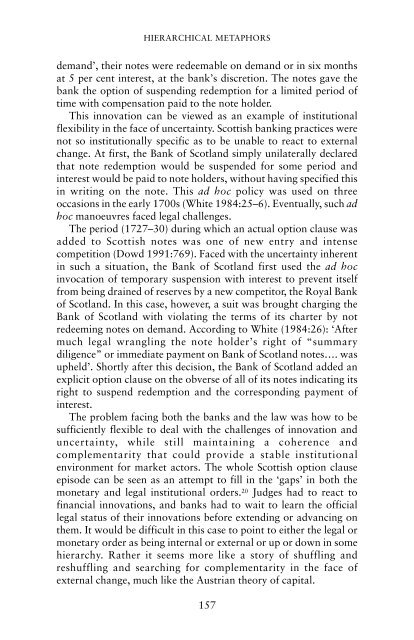Subjectivism and Economic Analysis: Essays in memory of Ludwig ...
Subjectivism and Economic Analysis: Essays in memory of Ludwig ...
Subjectivism and Economic Analysis: Essays in memory of Ludwig ...
You also want an ePaper? Increase the reach of your titles
YUMPU automatically turns print PDFs into web optimized ePapers that Google loves.
HIERARCHICAL METAPHORSdem<strong>and</strong>’, their notes were redeemable on dem<strong>and</strong> or <strong>in</strong> six monthsat 5 per cent <strong>in</strong>terest, at the bank’s discretion. The notes gave thebank the option <strong>of</strong> suspend<strong>in</strong>g redemption for a limited period <strong>of</strong>time with compensation paid to the note holder.This <strong>in</strong>novation can be viewed as an example <strong>of</strong> <strong>in</strong>stitutionalflexibility <strong>in</strong> the face <strong>of</strong> uncerta<strong>in</strong>ty. Scottish bank<strong>in</strong>g practices werenot so <strong>in</strong>stitutionally specific as to be unable to react to externalchange. At first, the Bank <strong>of</strong> Scotl<strong>and</strong> simply unilaterally declaredthat note redemption would be suspended for some period <strong>and</strong><strong>in</strong>terest would be paid to note holders, without hav<strong>in</strong>g specified this<strong>in</strong> writ<strong>in</strong>g on the note. This ad hoc policy was used on threeoccasions <strong>in</strong> the early 1700s (White 1984:25–6). Eventually, such adhoc manoeuvres faced legal challenges.The period (1727–30) dur<strong>in</strong>g which an actual option clause wasadded to Scottish notes was one <strong>of</strong> new entry <strong>and</strong> <strong>in</strong>tensecompetition (Dowd 1991:769). Faced with the uncerta<strong>in</strong>ty <strong>in</strong>herent<strong>in</strong> such a situation, the Bank <strong>of</strong> Scotl<strong>and</strong> first used the ad hoc<strong>in</strong>vocation <strong>of</strong> temporary suspension with <strong>in</strong>terest to prevent itselffrom be<strong>in</strong>g dra<strong>in</strong>ed <strong>of</strong> reserves by a new competitor, the Royal Bank<strong>of</strong> Scotl<strong>and</strong>. In this case, however, a suit was brought charg<strong>in</strong>g theBank <strong>of</strong> Scotl<strong>and</strong> with violat<strong>in</strong>g the terms <strong>of</strong> its charter by notredeem<strong>in</strong>g notes on dem<strong>and</strong>. Accord<strong>in</strong>g to White (1984:26): ‘Aftermuch legal wrangl<strong>in</strong>g the note holder’s right <strong>of</strong> “summarydiligence” or immediate payment on Bank <strong>of</strong> Scotl<strong>and</strong> notes…. wasupheld’. Shortly after this decision, the Bank <strong>of</strong> Scotl<strong>and</strong> added anexplicit option clause on the obverse <strong>of</strong> all <strong>of</strong> its notes <strong>in</strong>dicat<strong>in</strong>g itsright to suspend redemption <strong>and</strong> the correspond<strong>in</strong>g payment <strong>of</strong><strong>in</strong>terest.The problem fac<strong>in</strong>g both the banks <strong>and</strong> the law was how to besufficiently flexible to deal with the challenges <strong>of</strong> <strong>in</strong>novation <strong>and</strong>uncerta<strong>in</strong>ty, while still ma<strong>in</strong>ta<strong>in</strong><strong>in</strong>g a coherence <strong>and</strong>complementarity that could provide a stable <strong>in</strong>stitutionalenvironment for market actors. The whole Scottish option clauseepisode can be seen as an attempt to fill <strong>in</strong> the ‘gaps’ <strong>in</strong> both themonetary <strong>and</strong> legal <strong>in</strong>stitutional orders. 20 Judges had to react t<strong>of</strong><strong>in</strong>ancial <strong>in</strong>novations, <strong>and</strong> banks had to wait to learn the <strong>of</strong>ficiallegal status <strong>of</strong> their <strong>in</strong>novations before extend<strong>in</strong>g or advanc<strong>in</strong>g onthem. It would be difficult <strong>in</strong> this case to po<strong>in</strong>t to either the legal ormonetary order as be<strong>in</strong>g <strong>in</strong>ternal or external or up or down <strong>in</strong> somehierarchy. Rather it seems more like a story <strong>of</strong> shuffl<strong>in</strong>g <strong>and</strong>reshuffl<strong>in</strong>g <strong>and</strong> search<strong>in</strong>g for complementarity <strong>in</strong> the face <strong>of</strong>external change, much like the Austrian theory <strong>of</strong> capital.157

















